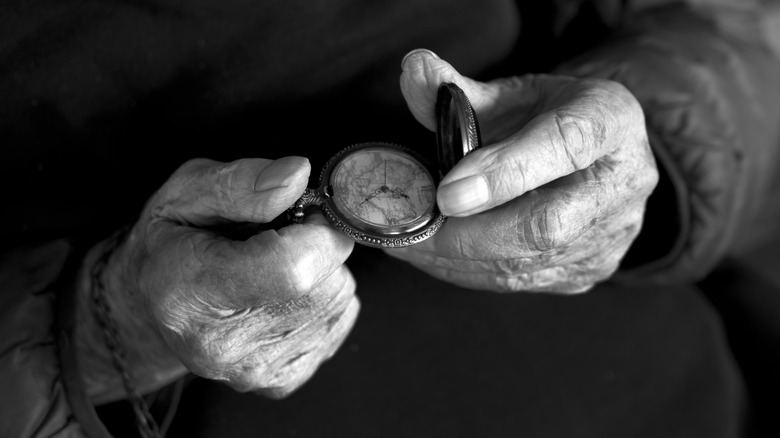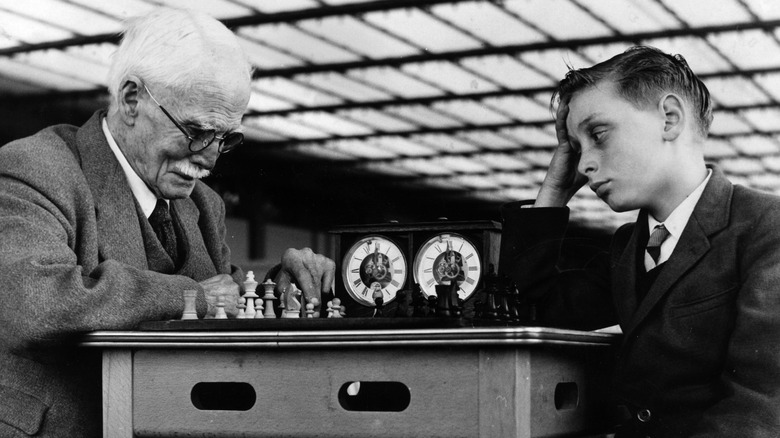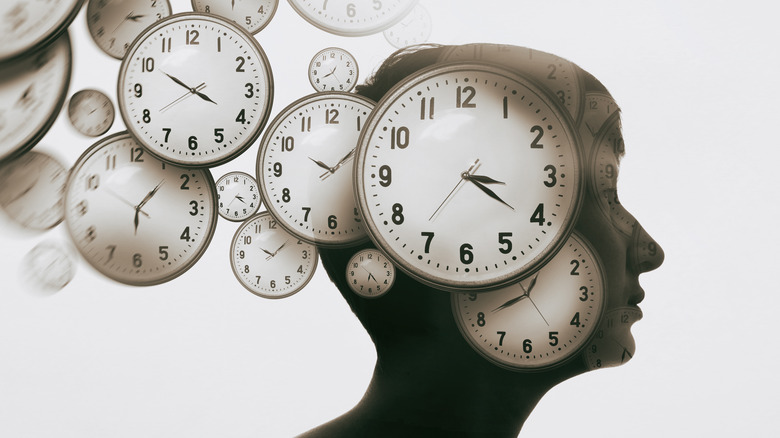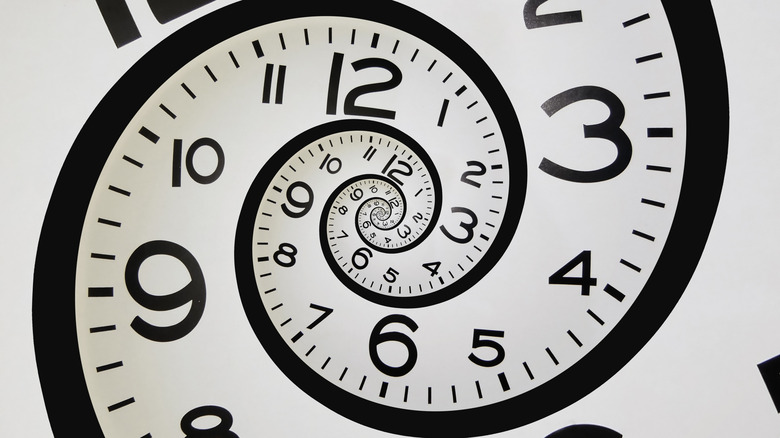The Real Reason Time Seems To Move Faster As You Age
After Albert Einstein published the theory of relativity, he and his secretaries were constantly bombarded by news outlets looking for a soundbite that would explain this world-shaking idea to those of us without physics diplomas. Einstein briefed his team with the following quote: "When you sit with a nice girl for two hours you think it's only a minute, but when you sit on a hot stove for a minute you think it's two hours. That's relativity" (via Quote Investigator).
We are all inherently aware that time is subjective. You probably first noticed in school that one particular semester felt shorter than the last one. In fact, when you came to think about it, you might also have realized that this whole school year seemed to have gone by in a flash compared to the last one. You may have shaken it off as an aberration, but then, as time went on, you began to realize that each and every school year seemed thinner than the last, that the last day before summer came around faster and faster each year.
In his memoir, "Summer of a Dormouse," written at the age of 75, the author John Mortimer noted: "In childhood, the afternoons spread out for years. For the old, the years flicker past like the briefest of afternoons. The playwright Christopher Fry, now 93, told me that after the age of 80 you seem to be having breakfast every five minutes."
That time speeds up as we get older has been widely observed, but can science tell us why?
The speed of time in proportion to memory
Some of the most common explanations concerning why time seems to speed up as we age are tied to memory, and, like memory, such explanations tend to be frustratingly fuzzy.
As noted by Psychology Today, one theory holds that our perception of time's passing is inherently linked to the years we have lived inasmuch as the elder among us have a deeper bank of memories to draw upon.
To a 5-year-old child, a single year feels incredibly long as it represents 20% of their life so far — more if we discount their infancy, which might not be remembered. To a person in old age, however, a year is a tiny fraction of the life they have lived.
This proportional explanation is somewhat satisfying in giving a rule of thumb as to how fast time might seem to be passing at different ages, but when we think about it, it still doesn't quite touch on why. Thankfully, however, experts in the fields of psychics and biology are increasingly trying to nail down the phenomenon in scientific terms.
A neural explanation
Writing for Psychology Today, Clifford N. Lazarus Ph.D explains a common experiment, in which both small children and older adults are asked to estimate unaided the passing of a single minute. According to Lazarus, children tend to vastly overestimate the passing of time, often guessing that a minute has passed within just 40 seconds. In contrast, adults often perceive a minute has passed at the 70-second mark.
Scientists have postulated that this disparity of time perception may be the result of the gradual slowing of the "neural pacemaker" of the brain. In childhood, the brain processes a greater number of images — Lazarus makes the comparison to a film camera rolling at a higher frame rate per second — but like the heart, the beating of which slows as we age, the process of neurovisual memory-making becomes slower-paced, meaning that time appears to pass more quickly.
Lazarus points to a 2019 paper by Professor Adrian Bejan, published in the European Review, which describes how more "actual time" passes between the arrival of each newly-created neural image. Bejan presents a series of scientific models which suggest the "perceived misalignment between mental-image time and clock time" in physics might be reflected in the slowing down of our neural processes, which might explain why those long summer months seem to become shorter as the years roll on.
We get better at perceiving time
It may sound from the experiment cited by Clifford N. Lazarus that children and adults tend to misjudge the passage of time in their own ways. And if the idea that the brain slows down isn't a particularly attractive one, other research into human time perception suggests that our sense of time's passing actually becomes more acute as we develop.
As noted by NBC News, neuroscientists conduct 'temporal bisection tasking," a basic experiment meant to measure the accuracy of time perception. Neuroscientist Patricia Costello explains: "You first hear a short tone that's about a fraction of a second. Then you hear comparison tones. You're supposed to respond after the short and long tone and say is if the next tone is more like the short or more like the long one."
In these experiments, it was discovered that the youngest children tested — around the age of five — had notable discrepancies in their perception of short tones. In particular, children in that age group tended to perceive short tones as longer than they were, which coincides with anecdotal evidence that time seems to pass more slowly in our formative years.
Adult life and repetition
Time may also seem to pass much more quickly when we are fully grown because of how differently we spend our time as adults in comparison to when we were children. In our early years, many of our experiences are formative and meaningful; often, we are experiencing things for the first time, getting to understand the world around us, and learning new things all day long.
However, as Scientific American argues, the older we get, the more familiar with the world we become. This, of course, is a good thing — it would be an uncomfortable experience to see the world anew each day. But as the surprises and spontaneity of childhood are replaced with the monotonous chores and routines of adult life, we create fewer new memories. Can you remember what you thought and felt while eating breakfast seven days ago? How about the last time you did the laundry? With fewer truly unique moments each day, multiple memories tend to blur into one.
How to slow down the passage of time
So it is possible to stop the growing sense that time is passing more quickly as the years go by? Is there anything we can do to slow down time?
Patricia Costello believes that embracing continued personal growth as an adult can help replicate the conditions of youth. "Children have routine and mundane moments, too, but they're always learning something new," she told NBC News. Being a lifelong learner, seeking out novel experiences, and being mindful during everyday activities can all help to rewire our brains so that they are processing more unique memories and therefore giving the impression that each day contains an abundance of detail, is more full, and therefore longer.
Don't eat the same breakfast every day. Take different routes to work. Go on spontaneous trips to new places. And — as NBC News also suggests — reflect on what you have done each day and everything that was unique about it, either in a journal or quietly to yourself, and you might find that time doesn't seem to pass quite as rapidly as it once did.





